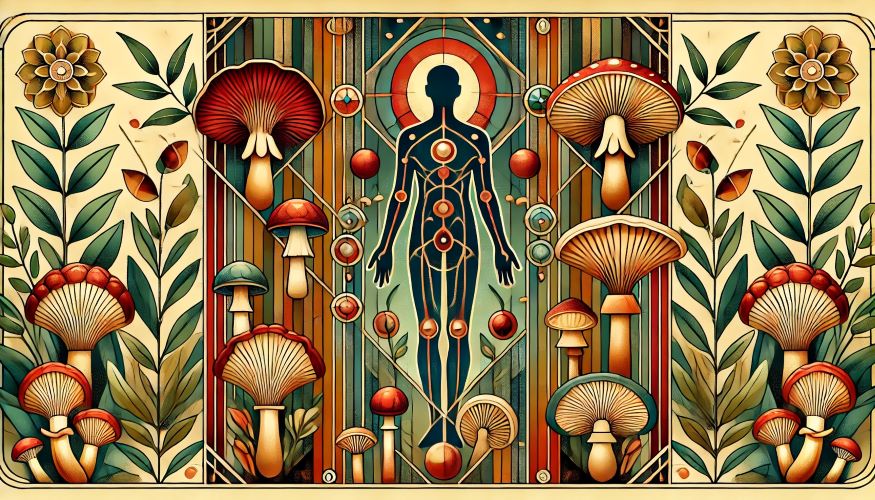Medicinal mushrooms and the immune system
This article is second in a series (of four) in which I examine herbal adaptogens, medicinal mushrooms, vitamins and minerals, antioxidants and other supplements, and the immune system.
We have focused on ARI's acute respiratory illnesses, such as the common cold, influenza, coronaviruses and pneumonia.
Medicinal mushrooms are gaining increasing recognition in functional medicine and health in general, but when researching this topic, it was not my natural first place to start.
Mushroom immune health research focuses primarily on their unique ability to modulate rather than simply stimulate the immune system. This distinctive feature sets them apart in the realm of immune health.
They come in teas, capsules, and extracts, but a lot of this research is relatively new and so less rigorous than that for some of the adaptogenic herbs discussed in my previous article, in short, we are still in the process of fully understanding the mechanisms.
Beta-glucans and Immune Modulation
A lot of research focuses on beta-glucans, which are found in high amounts in mushrooms, as a critical mechanism. Recent studies have shown that mushrooms contain these unique polysaccharides (beta-glucans), which interact with immune cells in the gut and activate immune pathways throughout the body.
Beta-glucans bind to receptors on macrophages and natural killer (NK) cells, effectively 'training' these cells to respond more efficiently to pathogens. This significant property in immune modulation suggests that mushrooms can help the immune system respond more precisely without causing excessive inflammation, providing reassurance of their potential benefits.
Anti-Inflammatory Pathways and Cytokine Reduction: Medicinal mushrooms such as reishi also contain triterpenes, compounds that have demonstrated the ability to reduce pro-inflammatory cytokines, particularly the two main "bad actors" TNF-alpha and IL-6 (although the IL-6 is more complex than good and bad), which are often elevated in chronic inflammatory conditions.
This selective anti-inflammatory action is particularly beneficial for people with autoimmune diseases, as it suggests mushrooms can lower inflammation without broadly suppressing immune function.
Immunological Memory: New research explores the idea that medicinal mushrooms may enhance immunological memory—an effect previously thought limited to adaptive immunity. Specifically, certain compounds in mushrooms, like those in reishi and shiitake, appear to prime innate immune cells for quicker responses. This could help explain why some people report fewer and shorter illnesses after regular mushroom intake.
Potential in Cancer Immunotherapy: Emerging studies highlight that compounds from medicinal mushrooms, like cordycepin in cordyceps, can enhance the immune system's response to cancer cells. Cordycepin has been shown to promote NK cell activity, specifically targeting cancer cells while preserving healthy cells. This targeted approach is proving helpful in enhancing the efficacy of cancer treatments, especially in trials combining mushrooms with conventional therapies.
Mushrooms with immune-enhancing properties
1. Cordyceps (1)
Why we chose it: Cordyceps is well-regarded for its dual role in immune enhancement and energy support. It primarily boosts immune function by increasing the activity of natural killer (NK) cells and macrophages, essential in identifying and eliminating infected or abnormal cells. Cordyceps is also known for its adaptogenic qualities, helping the body manage stress, which is a crucial component in immune resilience, especially during illness recovery.
Clinical Evidence: Medium
Several reviews on its effect exist, but none from the large institutes. However, this body of evidence is growing rapidly, with over 1,000 new studies published in the last five years.
Studies indicate that cordyceps can significantly improve NK cell activity, contributing to faster infection recovery and helping maintain a proactive immune defence.
For example, a study published in Oncotarget (2016) demonstrated cordyceps' role in enhancing NK cell activity and promoting immune homeostasis, particularly in stressed or immunocompromised individuals. Other studies highlight cordyceps’ beneficial effects on energy levels and stamina, which can be especially valuable during convalescence from illness. (2)
2. Reishi (ganoderma lucidum) (3)
We chose it: Known as the "mushroom of immortality," reishi is famous for its immune-modulating and anti-inflammatory properties. Its compounds, such as triterpenes and polysaccharides, interact with immune cells to balance the immune response, reducing the likelihood of an overactive response that could lead to chronic inflammation. Reishi is also adaptogenic, supporting stress reduction and indirectly enhancing immune function by helping the body maintain resilience under strain. (4)
Clinical Evidence: Medium with a large body of emerging evidence.
Synergistic Impact: Medicinal Mushrooms and Herbal Adaptogens
Medicinal mushrooms create a unique synergy when combined with adaptogenic herbs like astragalus and echinacea. The mushrooms provide balanced immune support through modulation, while adaptogens strengthen immune defences by enhancing immune cell activity and resistance to pathogens. This dual action reinforces a strong immune system without overstimulation, essential for reducing the risk of chronic inflammation and autoimmune responses.
Medicinal mushrooms like cordyceps and reishi and herbal adaptogen offer a comprehensive approach to immune health, emphasising resilience, balance, and prevention. Their integration into functional medicine protocols is valuable for managing immune responses sustainable and balanced.
Summary
Much research is being produced on mushrooms, which have already gained traction for their modulating effects. As a natural and potent immune modulator with adaptogenic effects, mushrooms clearly benefit immune health.
They have been used successfully as complementary treatments alongside conventional cancer treatments. They are safe, effective, and worth considering for immune and general health, improving energy, and managing stress.
Our take: Incorporating these mushrooms into your diet, especially if you suffer from autoimmune disease, could well help support your immune response.
Dr Geoff Mullan
Functional Medicine Doctor
References
- Das G, Shin HS, Leyva-Gómez G, et al. Cordyceps spp.: A Review on Its Immune-Stimulatory and Other Biological Potentials. Front Pharmacol. 2021;11:602364. Published 2021 Feb 8. doi:10.3389/fphar.2020.602364
- Narayanan S, de Mores AR, Cohen L, et al. Medicinal Mushroom Supplements in Cancer: A Systematic Review of Clinical Studies. Curr Oncol Rep. 2023;25(6):569-587. doi:10.1007/s11912-023-01408-2
- Neuwirthová J, Urbánková P, Smilek P. Immunostimulatory and anticancer effect of Reishi and Coriol extracts at the level of clinical studies and their implementation in practice. Imunostimulační a protinádorový účinek extraktů z Reishi a Coriolu na úrovni klinických studií a stav jejich zavedení do praxe. Klin Onkol. 2020;33(6):426-434.
- Galappaththi MCA, Patabendige NM, Premarathne BM, et al. A Review of Ganoderma Triterpenoids and Their Bioactivities. Biomolecules. 2022;13(1):24. Published 2022 Dec 22. doi:10.3390/biom13010024






